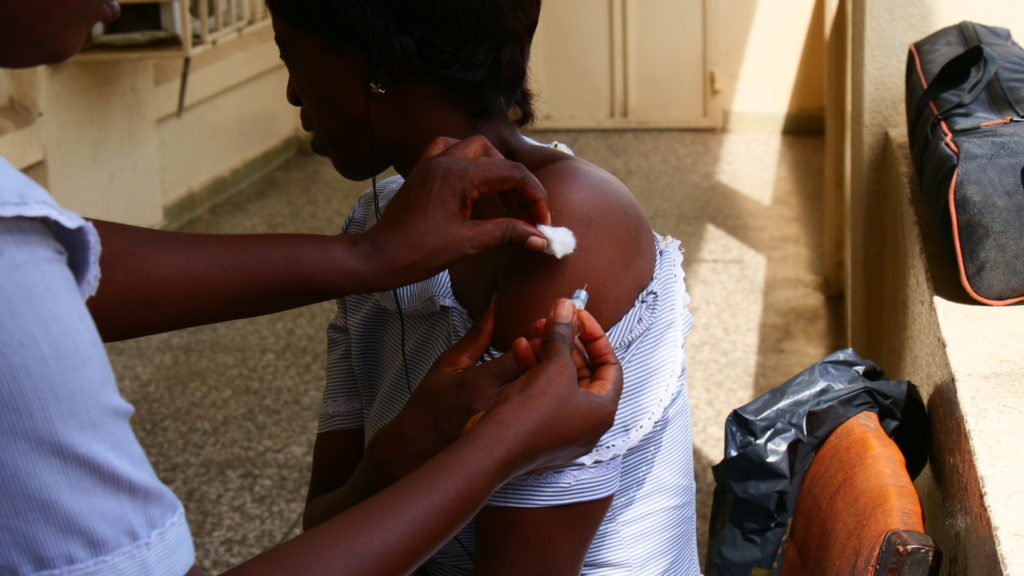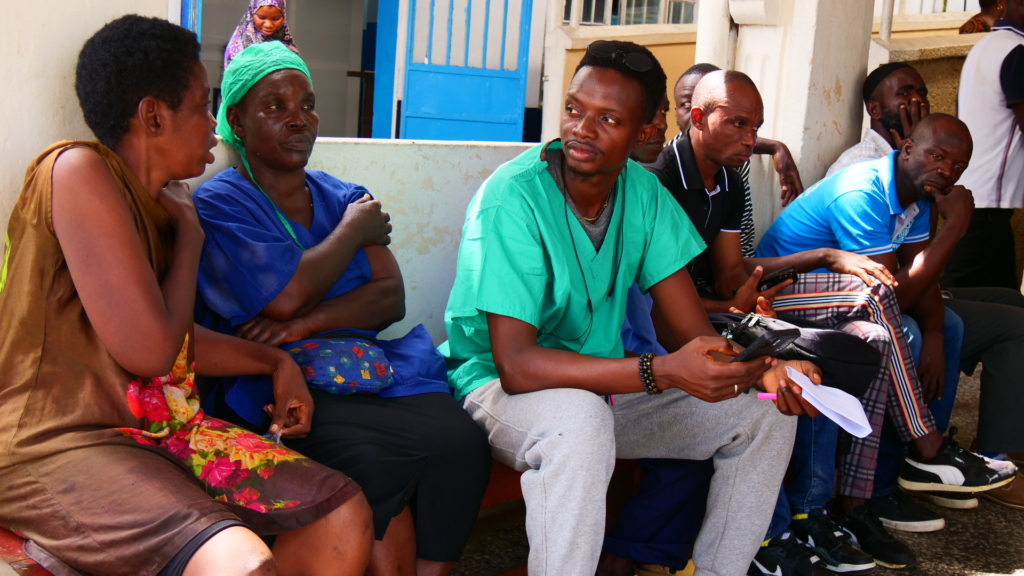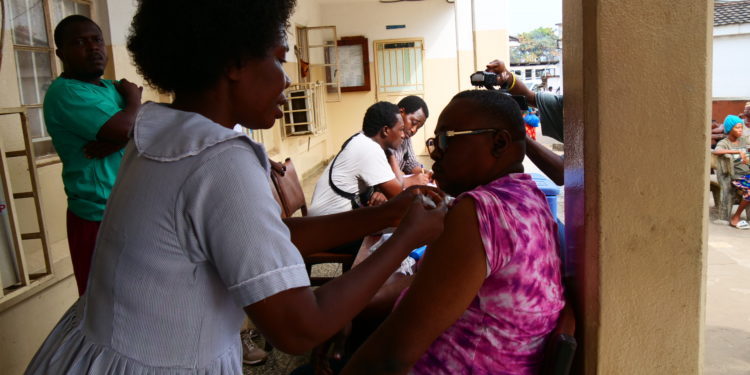By Kemo Cham
Sierra Leone on Thursday began vaccinating frontline workers against Ebola, nearly nine years after the world’s deadliest outbreak of the viral disease was declared over in West Africa.
Sierra Leone was one of three neighbouring countries most affected by that epidemic from 2014 to 2016. The outbreak which began in Guinea and spilled over to Liberia and then Sierra Leone, was declared Public Health Emergency of International Concern by the World Health Organization (WHO).
Over 11,300 people lost their lives to the disease in a total of 10 countries, with over 10,700 of the fatalities occurring in the three countries. Sierra Leone was the hardest hit, with 3,589 fatalities, out of 8,704 cases, according to WHO data.
In all three countries, health workers were one of the most affected groups. Sierra Leone lost 221 healthcare workers, representing 6.85% of its health workforce.
A WHO estimation shows that health workers were 32 times more likely to be infected by Ebola than the general adult population.
Sierra Leone becomes the first country, among those most severely affected by the 2014-2016 outbreak, to launch a nationwide preventive Ebola vaccination. The exercise targets 20,000 frontline workers in all 16 districts across the country.
Each person needs just a single dose of the vaccine to get fully immunized.

The government, through the Ministry of Health, is conducting the campaign in collaboration with WHO, UNICEF and the vaccine alliance, GAVI. They said in a joint statement that Ebola still poses a threat to many countries.
“With the virus presenting an ongoing threat in endemic regions, preventive Ebola vaccination will protect frontline workers, communities and health systems in advance, helping mitigate the impact of future outbreaks,” it said.
Besides healthcare workers, the campaign targets Okada (commercial) motor bike riders, traditional healers and security personnel (military, police and immigration officers), who are considered as the most vulnerable groups to such infectious disease.
Health Minister, Dr Austin Demby said the campaign marks a significant step in strengthening the country’s health system.
“Protecting our frontline workers is vital to our National Health Security Plan, ensuring preparedness and resilience against future health threats,” he said.
The exercise is running from December 5th to 15th.
At the Princess Christian Maternity Hospital (PCMH), the country’s main maternity health facility, health workers from across all cadres – doctors, nurses, cleaners and security – lined up to get their dose.
Among them was Foday Ambrose Marah, District Operations Officer for the Western Area Urban District Health Management Team, who headed the vaccination team. He told ManoRporters that the impact of the 2014 Ebola epidemic on healthcare workers was still fresh in the minds of people like him who were part of the response.
Marah worked at Kerry Town, a purposely built treatment center for health workers at the time.
“We know how many health workers died – a lot of them,” he said.
“When someone feels sick, their first port of call is the healthcare worker. And because of the empathy we show in our line of work, we always rush to help them. That makes us vulnerable. And that is why a lot of us died during Ebola,” he added.
The effect of the 2014-2016 epidemic is still being felt among those it affected, like survivor Daddy Hassan Kamara, who lost nine members of his family to the virus.
“I feel bad sometimes speaking about this because of what I went through,” Kamara said in an interview with ManoReporters.
Community Health Worker, Collins Thomas, who is attached to the Murray Town Community Health Center in the west end of Freetown, described the vaccine as a blessing for health workers.
Recalling his experience working in the Ebola response, he said:
“It was scary because we knew nothing about the disease. All we had were IPCS (Infection Prevention control). We learnt along the line.”
Mr Thomas said working in that situation was depressing and placed health workers in more danger.
“With this vaccine, we will now work with more confidence because we know we are protected…When you have confidence and trust with whatever you do, you do it wholeheartedly,” he said.

There were no approved vaccines when the outbreak erupted in 2014. But it offered opportunity to develop and trial candidate vaccines in development.
This vaccine being used in this campaign – Ervebo – which was developed by MERCK with funding support from GAVI, was trialed in 2016.
Ervebo was made to protect against the Zaire Ebola virus strain, which was responsible for the West African outbreak.
Dr Sania Nishtar, CEO of Gavi, said the Alliance is proud of how its mission to ensure timely and equitable access to vaccines against the most significant infectious disease threats has helped redefine Ebola response.
“To have the first nationwide preventive vaccination campaign take place in the country most deeply impacted by the 2014 outbreak makes this historic milestone even more meaningful,” he said.
After the 2014-2016 outbreak was declared over, Guinea had an outbreak in 2021. WHO said it conducted a rapid risk assessment following that, which classified the regional risk of spread as high.
In response, the global health body said it supported governments to implement immediate preventive measures such as enhanced surveillance, strengthened screening at border points, robust community engagement, and scaling up capacities for testing and treatment facilities.
Dr Thompson Igbu, who heads the immunization team at WHO Sierra Leone, said three years after the Guinea outbreak, the UN health agency remained committed to collaborating with partners and vaccine manufacturers to ensure the availability of life-saving vaccines for populations most at risk in the country.
“These sustained efforts and partnerships have led to the 2024 nationwide EVD vaccination campaign, targeting health care workers, traditional healers, motorbike taxi riders and other frontline workers,” he said.
Sierra Leone is not the only country to have benefitted from the Gavi preventive vaccination programme. The Democratic Republic of the Congo, Uganda and Guinea-Bissau are among countries that have already conducted the campaign. Central African Republic is also considering conducting the campaign.
WHO says a total of 18 countries that have previously reported EVD cases or that share a border with a country that has experienced an EVD outbreak are eligible for the programme, which aims to provide additional protection in the areas an Ebola outbreak is most likely to occur.






















